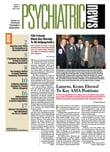The June 6 issue of Psychiatric News brought the good news that the DSM-V process will be “complex but open.” At the 2008 annual meeting, outgoing APA President Carolyn Robinowitz, M.D., stressed that with the development of DSM-V now under way, APA is demonstrating its commitment to “transparency” at a time of heightened public concern about pharmaceutical industry and other special-interest ties to medicine.
I found out how transparent and open the DSM-V process was when in a February e-mail to me from Darrel Regier, M.D., vice chair of the DSM-V Task Force, he informed me that he would not send me a copy of the minutes of DSM-V Task Force meetings as I had repeatedly requested over the past year. He explained that he and David Kupfer, M.D., chair of the DSM-V Task Force, had come to this decision because the Board of Trustees believed it was important to “maintain DSM-V confidentiality.” He noted that the Board had developed an“ acceptance form” that all task force and work group members were required to sign that essentially requires work group and task force members to agree to not discuss with anybody anything having to do with DSM-V. The language is quite clear:
“I will not, during the term of this appointment or after, divulge, furnish, or make accessible to anyone or use in any way... any Confidential Information. I understand that 'Confidential Information' includes all Work Product, unpublished manuscripts and drafts and other pre-publication materials, group discussions, internal correspondence, information about the development process and any other written or unwritten information, in any form, that emanates from or relates to my work with the APA task force or work group.”
I didn't know whether to laugh or cry. Laugh—because there is no way task force and work group members can be made to refrain from discussing the developing DSM-V with their colleagues. Cry—because this unprecedented attempt to revise DSM in secrecy indicates a failure to understand that revising a diagnostic manual—as a scientific process—benefits from the very exchange of information that is prohibited by the confidentiality agreement. Such exchange of information with colleagues was encouraged with the development of DSM-III, DSM-III-R, and DSM-IV.
It is hard to understand how the confidentiality agreements will benefit the process of developing DSM-V. Until they are no longer required, the DSM-V process can hardly be described as“ transparent” and “open.”
